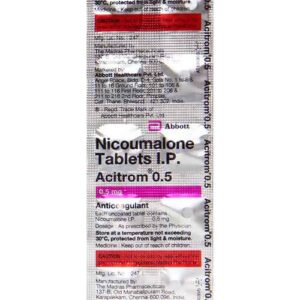ACENOCOUMAROL (NICOUMALONE)
ACENOCOUMAROL (NICOUMALONE): Acenocoumarol, also known as Nicoumalone, is an oral anticoagulant medication used to prevent and treat blood clotting disorders such as deep vein thrombosis, pulmonary embolism, and atrial fibrillation. It belongs to a class of drugs known as vitamin K antagonists.
The main mechanism of action of acenocoumarol is to inhibit the synthesis of vitamin K-dependent clotting factors II, VII, IX, and X in the liver. By decreasing the production of these clotting factors, acenocoumarol effectively decreases the ability of the blood to clot, preventing the formation of harmful blood clots.
The dose of acenocoumarol varies depending on the patient’s condition and individualized therapeutic response. The initial dose usually ranges from 4 to 8 mg per day, which is then adjusted according to regular monitoring of the patient’s international normalized ratio (INR). The goal of therapy is to maintain the INR within a target range specific to the patient’s condition.
It is important to note that acenocoumarol is a potent drug and can cause severe bleeding if not used correctly or monitored properly. Some common side effects of acenocoumarol include bruising, bleeding gums, nosebleeds, and prolonged bleeding from cuts. It can also cause gastrointestinal disturbances, skin reactions, and liver dysfunction in some cases. Additionally, there is a risk of serious hemorrhagic events, especially in patients with renal insufficiency, uncontrolled hypertension, or other risk factors for bleeding.
Due to the potential complications associated with acenocoumarol, it is essential for patients to have regular blood tests to monitor their INR and adjust the dose accordingly. It is also crucial to inform healthcare providers of any other medications the patient is taking as some drugs can interact with acenocoumarol and affect its anticoagulant activity.
It is advised to follow the prescribed dose and instructions provided by the healthcare professional while using acenocoumarol.

